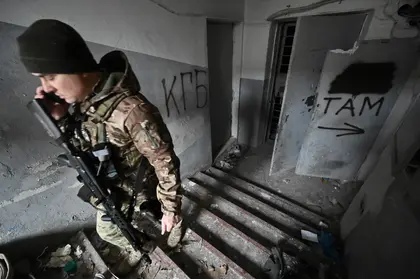Russian armed forces and associated groups systematically use torture in occupied areas of Ukraine, pointing to a "deliberate policy," a United Nations expert said on Friday.
The UN Special Rapporteur on Torture, Alice Jill Edwards, said she had drawn that conclusion following a visit to war-torn Ukraine in September.
JOIN US ON TELEGRAM
Follow our coverage of the war on the @Kyivpost_official.
"The volume of credible allegations of torture and other forms of cruel, inhuman or humiliating treatment or punishment (indicate that) torture is an element of Russia's war policy," she told the UN Human Rights Council.
"These grievous crimes appear to be neither random nor incidental."
Speaking to reporters, Edwards said Ukrainian prosecutors had told her there were around 103,000 open cases related to war crimes and crimes against humanity, of which 90 percent were registered as torture cases.
Edwards, who said she had personally examined dozens of cases involving alleged abuse by Russian forces and their allies, said there was clearly "an intent and purpose to carrying out the torture that cannot be described away as aberrant behavior or ad hoc behavior."
In a report following her visit, Edwards found that "torture has been carried out in an organized and systematic manner," with the same practices allegedly carried out across different occupied regions.
Her findings, she told the council, point "to direct authorization and a deliberate policy."

Ukraine Says Russia Provides North Korean Troops Fake Russian Military IDs
- Torture 'never permissible' -
Edwards and other special rapporteurs are independent rights experts, who are appointed by the UN Human Rights Council but do not speak on behalf of the UN.
On Friday, she reiterated a plea for Moscow to "issue a strong and unequivocal directive ... that torture is never permissible and that it will be punished."
Edwards, who has been denied access to Russia, also urged the country to "open investigations into these allegations and allow international monitors into all places of deprivation of liberty and to observe criminal proceedings."
Turning to the conditions Russian prisoners of war face in Ukrainian custody, she said "sincere efforts were being made by the Ukrainian authorities to treat POWs respectfully."
Her report did, however, raise concerns about conditions in one penal facility in Lviv, where Ukrainian nationals charged with collaborating with the Russians were being held.
And she said she had received "several allegations of abusive treatment by Ukrainian officials," mainly in connection with the capture, arrest and transit of prisoners.
"I call on the Ukrainian authorities to investigate such allegations promptly, to reinforce training and disciplinary and other preventive measures, and to guarantee the protection of all legal rights of all complainants and detainees," she said.
You can also highlight the text and press Ctrl + Enter






